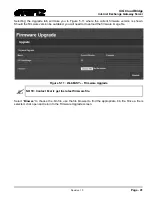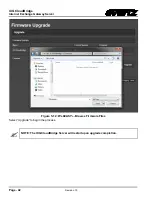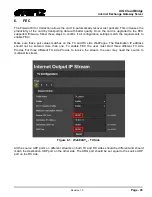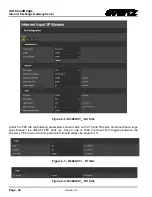
IXG CloudBridge
Internet Exchange Gateway Server
Revision 1.0
Page - 35
5.4.1.
Stream Control
Stream Name:
This parameter displays the
RX side IP Stream profile name.
Enable:
This dropdown allows the user to enable or disable proxy.
AES Encryption:
This dropdown allows the user to enable or disable AES encryption.
Restart:
This control allows the user to
r
estart the individual RX side IP Stream.
5.4.2.
Network
ARQ Enable:
This parameter allows the user to select the
RX side IP Stream IP Transport Mode: ARQ or
RTP. ARQ enables retransmissions so should normally be enabled when transmitting over the public
internet or similar lower reliability networks.
Destination IP Address:
This parameter allows the user to set the
RX side IP Stream Network
Destination IP address. This means the IP address that the received transport stream will be output on to
the access port.
Destination UDP Port:
This parameter allows the user to set the
RX side IP Stream Network Destination
port number. This means the IP address that the received transport stream will be output on to the access
port.
Source UDP Port:
This parameter allows the user to set the
RX side IP Stream Network Source UDP port
number. This means the UDP port that the received transport stream will be output on to the access port.
Expected Jitter:
This parameter allows the user to set the
RX side IP Stream Network expected jitter for
the WAN network.
5.4.3.
ARQ
ARQ Port:
This parameter allows the user to set the
RX side IP Stream ARQ port. This must match the
ARQ port on the transmitting IXG CloudBridge Server-T, or Evertz Cloudbridge.
By default, ARQ
normally sends upstream retransmission request packets on UDP port 7020. The ARQ Port setting
can be changed to any valid and non-conflicting UDP port. However, the same port number at both
the encoder and the decoder should be defined. To help bypass firewall blocking, reset this to be the
same port as the media UDP port, usually 10000.
ARQ Mode:
This parameter allows the user to set the
RX side IP Stream ARQ mode
:
Auto or Manual.
Auto will attempt to pick appropriate values based on network conditions, while manual gives the user full
control over retransmission parameters. When AUTO is set, you cannot set the number of retransmits or
the round trip latency.
Target Latency:
Target Latency, specifies the total delay, in milliseconds, allotted for the request,
retransmission, and recovery process. The ARQ mechanism will attempt as many retries as possible
within this target latency time. Thus, larger target latency times increase the delay before video is output,
but allows for more chances of requesting and recovering any missing packets. The ARQ error correction
operates through the addition of a small additional buffering delay to provide enough time to request and
receive replacement for each lost packet. Target Latency gives the ARQ mechanism a target value for
determining the necessary ARQ delay. The ARQ divides the Target Latency, specified in milliseconds, by
the round-trip time to the video encoding source to determine the number of request attempts. Unless
Robust Mode is enabled, it sets a minimum ARQ latency of one round-trip time. A larger Target Latency
allows the system to increase the number or repeat requests.










































